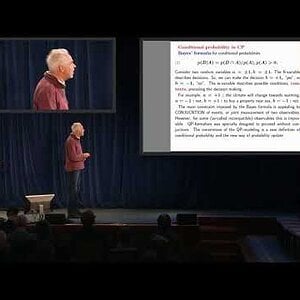Cognition Definition and 10 Threads
-

What are the implications of quantum biology on cognitive computational models?
I am a student and researcher interested in the mind, brain, related biological processes and emerging "mental" processes. I am interested in cognitive computational models, implementing new computational paradigms.- EFech
- Thread
- Brain Cognition Protein folding Quantum computing
- Replies: 2
- Forum: New Member Introductions
-

Conflicting interpretations of rosemary oil study
The journal in question is the International Journal of Neuroscience, which appears to be a respectable peer-reviewed journal. I give a link to a reproduction in a secondary source, with a note that I am not addressing the more subjective "mood" part of the paper...- nomadreid
- Thread
- Cognition Interpretations Memory Oil Study
- Replies: 5
- Forum: Biology and Medical
-
Application of Quantum Theory to Cognition, Decision Making and Finances - Andrei Khrennikov
Source: http://emqm17.org/presentations/- Vaxjo
- Media item
- cognition finance quantum theory
- Comments: 0
- Category: Quantum
-

Quantifying the effects of physical exercise on cognition
We all know that there's plenty of evidence showing that exercise does benefit cognition. https://www.ncbi.nlm.nih.gov/pmc/articles/PMC3951958/ The real question is how can I actually use this in practice to get real world results. So if I spend 8 hours a day studying a certain subject/trade...- FallenApple
- Thread
- Cognition Effects Exercise Physical
- Replies: 2
- Forum: Biology and Medical
-

How does the brain strike a balance between arousal and energy conservation?
Does emotion play a direct part in logical reasoning?- Loren Booda
- Thread
- Cognition
- Replies: 6
- Forum: General Discussion
-
J
Understanding the Process of Learning and Thinking?
Stemming form another thread that has gone quiet I have a question with respect to cognitive science. It is interesting to study cognitive science which in essence is the study of learning and thinking. I break how we construct our morals, opinions and values down into phases. 1. We receive...- jonourd
- Thread
- Cognition Process
- Replies: 13
- Forum: General Discussion
-
K
Mathematica Are cognition levels and mathematical operations linked ?
Let consider this small example...I find it interesting, but I think it does not in fact tell anything about reality : You are in presence of somebody, and another one enters the scene :Operation "times" : a) subjectively (as seen from you), the number of person is for you : x 2 : 1...- kleinwolf
- Thread
- Cognition Levels Mathematical Operations
- Replies: 3
- Forum: MATLAB, Maple, Mathematica, LaTeX
-
D
Evolutionary Theory On Cognition and Behavior
Here is a summary of the research published in the June 2005 issue of Psychology, Public Policy and Law, a journal of the American Psychological Association: http://www.eurekalert.org/pub_releases/2005-04/cdri-bai042505.php Also see http://www.news-medical.net/print_article.asp?id=9530...- Dennis4
- Thread
- Behavior Cognition Theory
- Replies: 6
- Forum: General Discussion
-
S
How Did Evolution Shape Human Intelligence?
The Origin of Mind: Evolution of Brain, Cognition, and General Intelligence, 2005 Hello, I liked the book The Origin of Mind: Evolution of Brain, Cognition, and General Intelligence, by David C. Geary, 2005 because it not only discusses some of the latest research on human intelligence, but...- Scientific Method
- Thread
- Brain Cognition Evolution General Intelligence Mind Origin
- Replies: 2
- Forum: General Discussion
-

Cultural constraints on cognition?
Marcus, you mentioned an interest in linguistics. I wonder what your neighbor would think about this. I have been interested for some time in tribal cultures in South America and New Guinea. This tribe, the Piraha, is the most unusual I have come across. I'd like to know what you and...- Evo
- Thread
- Cognition Constraints
- Replies: 2
- Forum: General Discussion
